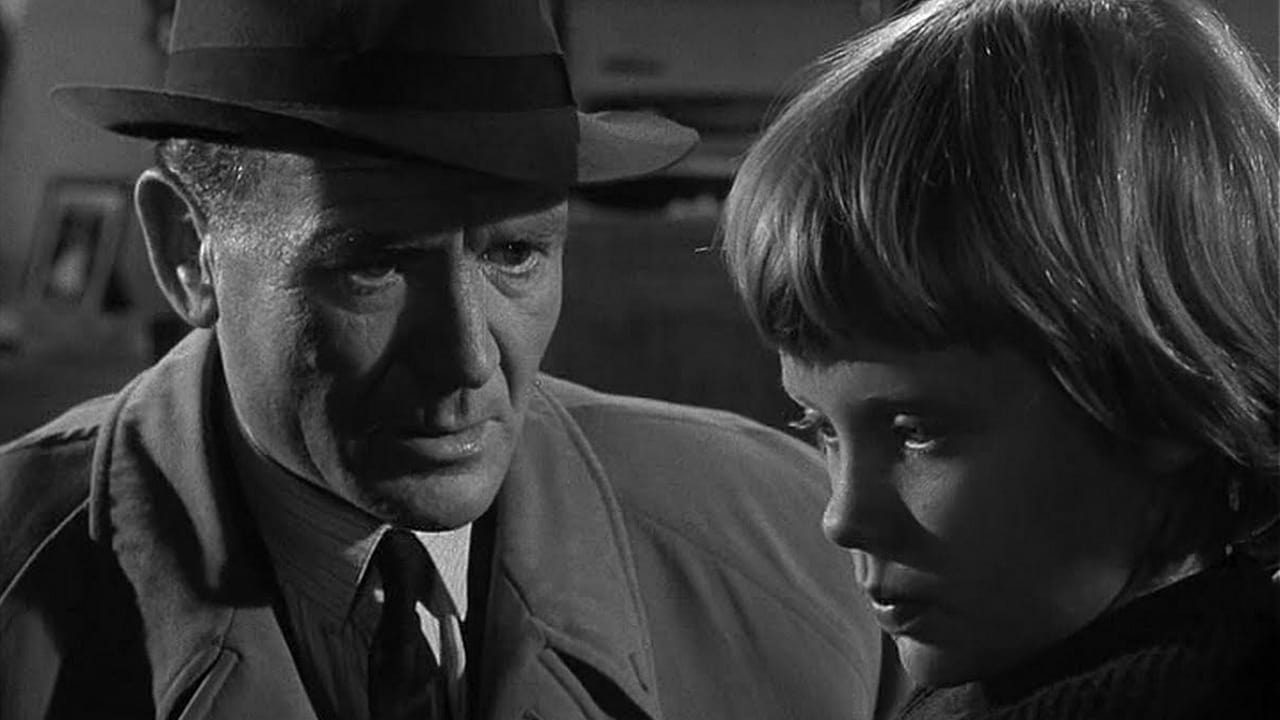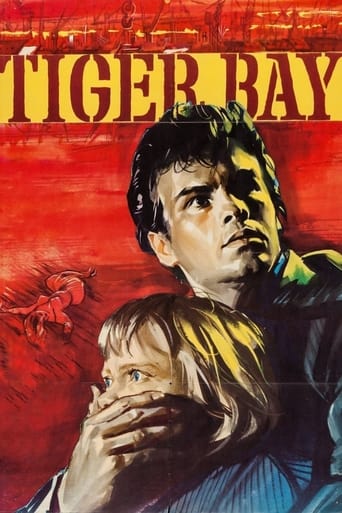PimpinAinttEasy
Dear J.Lee Thompson,you did make a superb film every once in a while in what was a patchy career. Tiger Bay is one of those superb films.It starts off as a sort of a film of place. I liked the English port town filled with a mix of native British and Polish and Caribbean immigrants. With everyone living cooped up together in small flats and narrow spaces.Then it turns into a man and girl on the run film. The chemistry between Hayley Mills and Horst Buchholz really worked. Hayley Mill's performance is probably among the top ten ever by a child artist. Her calm and cunning demeanor is a perfect foil for Buchholz' intensity.The film is also a great crime thriller. There were a lot of interesting twists. The final scenes kept me on the edge of my seat.I liked how you made the viewer care for the murderer. I was rooting for him in the end.Best Regards, Pimpin.(8/10)
robert-temple-1
Tiger Bay is the colourful and unusual name of the large bay harbour of the Welsh port of Cardiff, where this story is entirely set in the 1950s. This is the film which introduced the twelve year-old Hayley Mills to the screen. It made a huge impact at that time and has remained famous ever since, not least because it is a powerful and intense psychological thriller, with a friendship between a young girl and a grown man who has unwittingly committed a murder at its heart. From the very first instant that we see Hayley Mills staring through an iron grill in the street where she lives, with her huge expressive eyes and her sandy lashes, something happens to us. We realize that this is not an ordinary child actress we are seeing, but an apparition. No one can ever understand those ineffable personal qualities which combine to produce a human presence on screen which force everyone to watch, so that we cannot take our eyes away for a second. Hayley Mills's qualities go way beyond mere charm and have nothing to do with being cute. She embodies something, one cannot say what, but certainly it includes freshness and spontaneity and a complete lack of self-consciousness or vanity. She is heedless of how she looks, and if she furrows her brow or scrunches up her face (two of her endearing mannerisms) she does not care a jot about what this might possibly look like. As a child actress, she was the diametrical opposite of Shirley Temple, whose mother was always fussing over her before each take and just before the director would say 'Action!' she would harass her child by shouting: 'Sparkle, Shirley, sparkle!' Miss Mills's father John Mills on the other hand was very laid back and did not require any vicarious satisfaction through his child. The story is very famous in cinema history that the director J. Lee Thompson dropped by John Mills's house for lunch in the London suburb of Richmond, plagued with his problem of casting the lead child in his next film. Mills's younger daughter was playing in the back garden and lolloping around in a rather tomboyish way when she unexpectedly caught Thompson's eye and he became riveted by her rather unusual personality, which might be described as 'somewhat quirky'. In a TV portrait of him late in life, John Mills was asked by the interviewer about this incident, and he frankly described his younger daughter at that time as 'a funny little thing', and said no one had ever imagined her becoming a child actress. But it was just those indefinable qualities of being unlike other people despite looking normal that made Hayley Mills perfect for this part, and it made cinema history. She is called Hayley after an ancestor, the English writer and poet William Hayley (1745-1820), a friend of William Blake and William Cowper, author of numerous volumes and patron of the painter George Romney and others. Before her, no one ever had the first name of Hayley, and all the thousands of girls named Hayley in the world today are named after her whether they realize it or not. The film actress Hayley Atwell (born 1982), for instance, enjoys telling people that she is named after Hayley Mills. It is impossible to overestimate the cultural and social influence which Hayley Mills exerted in her career simply by existing. When this film was released, it was spotted by Walt Disney, who signed her up to play the lead in one of his most influential films, POLYANNA. Miss Mills's earnest and heedless cheerfulness, her insouciant optimism and irresistible smile, made her an instant international icon of hope that everything might really turn out all right in a difficult world. It was after this that the more cynical and world-weary of the chatterati began to refer to her as 'Little Miss Sweetness and Light', because all that shining goodness in her face was simply too much for them. And she went on and on, in film after film, radiating goodness and good cheer and inspiring hundreds of millions of people all over the world, not least the entire population of Middle America, that vast space between the two coasts inhabited by ordinary people whom the trendies of the media so utterly despise because they have such unfashionable traits as values and morals. To them, Hayley Mills might as well have been an angel come down from heaven to bring them joy, but what made this work was that she herself was entirely oblivious of the effect she was having on a large proportion of the population of the entire world, and she imagined that she was quite ordinary. Such lack of ego was, of course, the essential ingredient. She was born a good person, and in some respects the secret of her appeal is as simple as that. And, unlike Shirley Temple, Hayley Mills did not have to be told to 'sparkle', for she radiated all that sweetness and light with all the naturalness of a frolicking lamb which leaps in the sun just because it is a fine day and the grass is green. I daresay that no film actress has ever had a greater impact upon the world than Hayley Mills, not even the sultry and mysterious Greta Garbo. She became the world's tonic. You might be depressed, but if you went to see a Hayley Mills film, you would emerge convinced that everything might really turn out all right after all. And yet the character of Gillie Evans which she plays in TIGER BAY is that of a disturbed girl who is a compulsive liar, and she is not sweet at all. The German actor Horst Buchholz plays the Polish sailor with whom she becomes entangled. He learned to speak Polish for the part. The film is extremely intense and is a true classic of its time.
eigaeye
There are a stack of good reasons for watching this movie: an extraordinary performance by the young Hayley Mills, in her first film; a solid storyline; deft direction by J. Lee Thompson; interesting Welsh locations; striking black and white photography; and a beautiful editing job. All good reasons. But the best reason, for me, is that the film depicts a warm, surprising relationship between a young man and a pre-teen girl, strangers until a chance meeting, that is not clouded or cloyed by hysterical and ugly suppositions of impropriety. It is hard to imagine this subject-matter being treated with such directness and vitality in a movie made today. The available DVD contains a brilliant transfer and fascinating commentary by Hayley Mills recorded in 2004. She has a lot to say about her co-star, the German actor, Horst Buchholz, who is terrific in the firm, and about working alongside John Mills, her father, who plays the investigating detective with his usual aplomb.
Michael Neumann
A precocious young tomboy with a gift for mischief finds more than her usual trouble when she witnesses a murder and later befriends the killer: a lonely Polish sailor on English shore leave. Both are misfits on the Cardiff docks, he because of his crime and nationality, she by her willful streak of independence, and their relationship is only one of the surprises in this tense, often touching suspense drama. The script succeeds in the near impossible task of maintaining sympathy for every character: the reluctant fugitive, the single-minded detectives hot on his trail, and above all for young Hayley Mills, who in her first major role steals the film playing the sassy, resourceful heroine. The most memorable scene shows her singing God's praise in a church choir, while surreptitiously showing off the murderer's gun to an envious friend.

